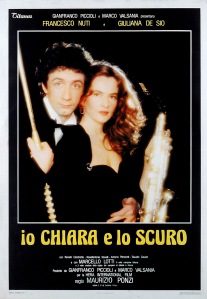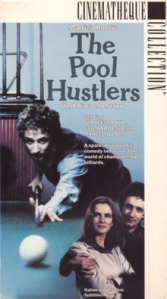In almost 60 years of television shows featuring billiards, one episode is consistently – and perhaps, rightfully – lauded as the best: “A Game of Pool” from Season 3 of The Twilight Zone. Aired in October 1961, just 3 weeks after The Hustler was released on the big screen, this 25-minute show is about “the story of the best pool player living and the best pool player dead,” according to Twilight Zone creator Rod Serling.
http://www.hulu.com/watch/440810
Jack Klugman stars as Jesse Cardiff (the best pool player living) and Jonathan Winters stars as James Howard “Fats” Brown (the best pool player dead). That’s it. Two great actors in a single room pool hall on Randolph Street in Chicago. How these two come to play pool is because Jesse yells aloud, “I’d give anything, anything to play him one game!” And, since this is the Twilight Zone, the deceased Fats suddenly appears, saying to the dumbstruck Jesse, “[Am I] dead?…Not really…as long as people talk about you, you’re not really dead.”
Faced with an once-in-a-lifetime (literally) opportunity to play Fats, Jesse accepts the terms of Fats’ deal: “Life or death. You beat me, you live; you lose, you die.” And so begins a game of 14.1 continuous pool (i.e., straight pool, same game in The Hustler) to 300 points. For those that don’t know, straight pool is played by pocketing any called ball into a designated pocket. Each pocketed ball is a point. For a given rack, when one ball is remaining on the table, the opponent re-racks the remaining 14 balls before game play continues.
While the filmed pool playing is at best average (except for a couple nice three-cushion shots), there are two aspects of the billiards that are noteworthy. First, there’s nothing brief about straight pool. As one reviewer noted, given the final score approaches 299-266, that translates into about 40 racks, or easily 5-6 hours of play. It’s no wonder both men are sweating considerably.
The second aspect is the trash-talking. Pool, like so many sports, is a true mental game. And pool players will often do what they can to rattle their opponents. In this match, the taunting starts before play even begins, as Fats says to Jesse, “You like to play with fire, but you don’t like to cook…deep down you know you’re second rate.” As the game progresses, Fats condescendingly lectures Jesse that “pool is geometry…a science of precise angles and forces.” And, in the final points (for reasons we only understand at the very end), he resorts to cheap tactics to distract Jesse. Since this is the Twilight Zone, we know there will be a final twist. I won’t give it away. Watch the episode.
The full episode of “A Game of Pool” is available to watch above. “A Game of Pool” was also remade in 1989, starring Esai Morales and Maury Chaykin. That episode will be the subject of a future post.
And as a final postscript, let us say R.I.P. to Jonathan Winters, who passed away just 3 months ago.











